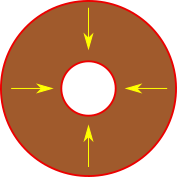i have seen similar questions but not exactly what am looking for.
what i want to know is if the planet would stay as a planet rather than tearing it self apart into large separate chunks.
i know its orbit will change but but i need to know if its possible not to get pulled into the star or crash into into another planet and just survive in its new orbit long enough for for another species to discover it millions of years later and possibly finding evidence of what happened.
EDIT : to add more clarity the world in my story has a fusion between magic and technology and supernatural beings/gods also exist. one of the gods is actually the core of the planet its not the usual core though thats just its body, any function/effect that a regular planet core had it could also copy using magic and it formed/built the planet around it self as shell for protection and later teleported away (leaving vacuum in its place) to escape from danger


